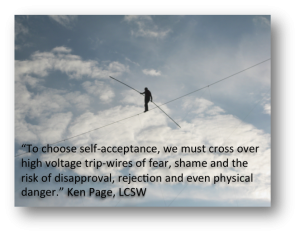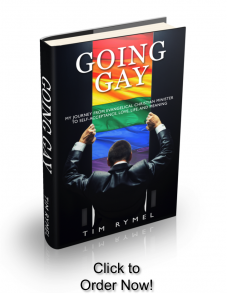Would You Jump Off A Cliff to Save Your Life?
 Phillip was married with three children and living the good life in the suburbs of a Northern California town. He was a successful lawyer at an environmental law firm. Phillip loved his wife and family, but couldn’t stop meeting guys for an occasional hookup. Inevitably, he felt guilty after every encounter, but he knew he’d do it again.
Phillip was married with three children and living the good life in the suburbs of a Northern California town. He was a successful lawyer at an environmental law firm. Phillip loved his wife and family, but couldn’t stop meeting guys for an occasional hookup. Inevitably, he felt guilty after every encounter, but he knew he’d do it again.
Charlene was the mother of two, held a PhD in Biblical studies and taught at a local Bible College in a big Mid-western city. In spite of her loving husband and well-earned reputation as a woman of integrity, Charlene was living a lie. The despair of hiding her truth as a transgender person drove her to a secret life of alcoholism. She attempted suicide on more than one occasion. Her family kept it a secret.
On the outside, it looked like these people had everything anyone could ever want. Why couldn’t they be happy? What drives someone to put his or her entire life, career and family at risk?
Love.
It seems counter-intuitive. Why participate in risky behaviors and lose a seemingly secure environment of family and status? Inside every human being lives the desire to be known for exactly who we are, not who we are perceived to be. Living a lie, even if only we know it, can drive us mad.
Psychotherapist Ken Page wrote:
“When we’re denied love, our battle to reclaim it teaches everyone what love really means. Virtually every LGBT person is forced to make a choice: We must choose between self-acceptance and self-loathing. Truth and safety. Yet this choice is universal. It’s bigger than sexual orientation or gender identity. It’s everyone’s challenge. Being the first to say “I love you.” Expressing a part of ourselves we’ve hidden from everyone. Standing up for an unpopular idea. Saying “no” to our own guilt and shame so we can move ahead with what really matters to us. There are countless ways to come out.”1
My introduction to heterosexual marriage was difficult at best. Life, by being obedient to God, as I understood it, soon became perfunctory. The American dream of fitting in was equivalent to getting a new car: within the year, the new car smell was gone and the cost of maintenance began to outweigh the emotional cost of keeping the car. Life became a list of things to do to maintain status quo. I was dying a slow, painful, passionless death. I wanted to live.
Though divorce was decided for me, it was still six more years before I found the courage to step outside the box I was certain contained all the answers. Living, I discovered, was all about uncertainty. It was the biggest step of faith I’d ever taken. The willingness to get rejected on a grander scale. It was jumping off a cliff with nothing more than a hope that a branch would stop the fall on the way down.
For years I preached that people should follow the rules. Think inside the box. Color inside the lines. Like Columbus’ crew, I feared sailing too far in any direction meant falling into the abyss.
As it turned out, the further I sailed the more enchanted with life I became. Risks turned into discoveries. Admissions of guilt became calls for friendships. My pain turned into my passion.
I was finally alive.
1Page, Ken, Finding Love, Why Coming Out Isn’t Just for Gay People, Psychology Today, May 5, 2013, http://www.psychologytoday.com/blog/finding-love/201305/why-coming-out-isnt-just-gay-people
Tim
Share what you think below.
Hire Tim to speak at your event
 Tags: christian living, gay christian, LGBT, Shame
Tags: christian living, gay christian, LGBT, ShameDel.icio.us


TweetThis

Digg

StumbleUpon

Comments: 0 (Zero), Be the first to leave a reply!You might be interested in this:
 Believing is Perceiving
Believing is Perceiving  Truth or Dare (to Love)
Truth or Dare (to Love) Gays, Christians and Change Management
Gays, Christians and Change Management Why are the Christians silent?
Why are the Christians silent? ChurchianityCopyright © Tim Rymel [Would You Jump Off A Cliff to Save Your Life?], All Right Reserved. 2014.
ChurchianityCopyright © Tim Rymel [Would You Jump Off A Cliff to Save Your Life?], All Right Reserved. 2014.The post Would You Jump Off A Cliff to Save Your Life? appeared first on Tim Rymel.




